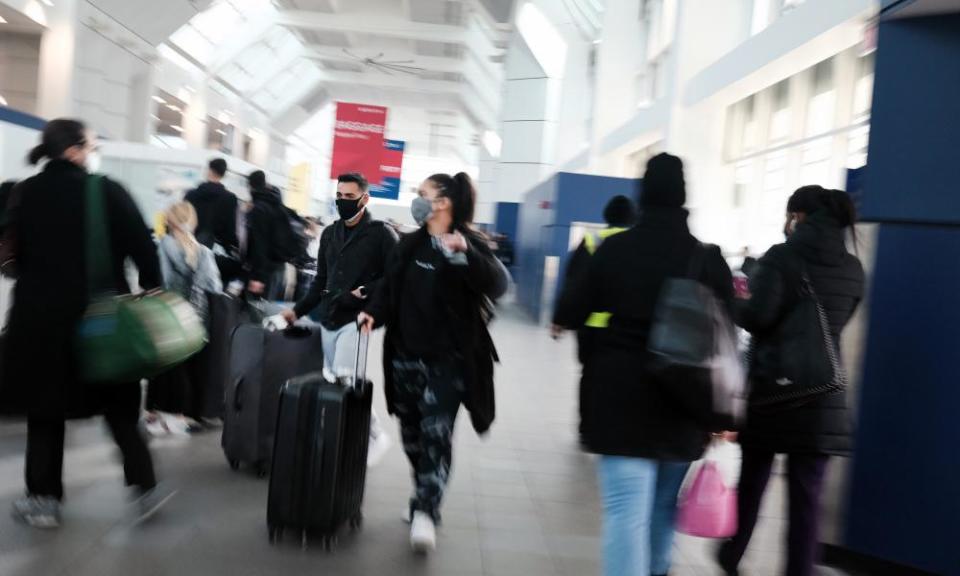Millions of Americans to travel and gather for Thanksgiving despite expert warnings

Millions of Americans are traveling and gathering for the Thanksgiving holiday, in spite of dire and urgent warnings from US doctors, nurses, health authorities and hospitals not to do so.
The travel raises the possibility of a “surge superimposed on a surge,” in the words of Dr. Anthony Fauci, the nation’s top infectious disease expert, and of a wave of deaths as Christmas arrives.
“There is so much community transmission all over the United States that the chances of you encountering somebody that has Covid-19 is actually very, very high, whether it’s on an airplane, at the airport or at a rest area,” said Dr Syra Madad, an infectious disease epidemiologist for New York City hospitals.
Nearly 12.5 million Americans have been diagnosed with Covid-19 and more than 258,000 have died, according to the Johns Hopkins University coronavirus tracker. Doctors and nurses have reported severe burnout, and some healthcare facilities have seen emerging staff shortages. States such as North Dakota have recently led the world in the death rate from the disease.
In spite of this, several recent surveys show a meaningful minority of Americans have not changed Thanksgiving plans, and intend to go ahead with travel and gatherings.
A New York Times survey showed more than a quarter of Americans still planned to dine with people outside their household. An Axios-Ipsos poll found 39% of Americans had not changed their travel plans at all, while 61% have decided to limit gatherings to those only in their household, have small dinners and avoid travel.
AAA, which is best known for its roadside assistance program, forecasts travel quarterly. The group found most people were planning shorter trips in cars this year, as opposed to cross-country travel by train, plane or bus. Air travel is down 47.5% from 2019.
Stephen Browning, a retired executive from Tucson, Arizona, will be flying to Seattle for Thanksgiving with his sister. The celebration usually has up to 30 people. This year only 10 are coming, and everyone was asked to get a coronavirus test. He doesn’t plan on removing his mask to eat or drink on the flight.
“This is my first flight since December 2019, so yes, I have concerns,” said Browning. “But I think most airlines are acting responsibly now and enforcing masks on all flights.”
The Thanksgiving season now comes in the midst of recent good news about vaccine development, which some doctors and health officials hoped would serve as an incentive for people to take precautions against the virus.
We're so close to an era with mass testing, therapeutics and several vaccines -> why risk getting infected & infecting others over the holidays? Delaying by a few months is perfectly rational given solutions within sight in the Spring. We've been in this for 10 months already.
— Prof. Devi Sridhar (@devisridhar) November 23, 2020
The surge and repeated public health warnings appears to have led to a “wait-and-see” travel cohort, which surveys show will likely travel by car and may decide very late whether to cancel plans.
“The wait-and-see travel trend continues to impact final travel decisions, especially for the Thanksgiving holiday,” said Paula Twidale, senior vice president of AAA Travel. As a result, car travel is only expected to drop 4.3% this year.
In one microcosm of Americans’ potential travel plans, a survey by mobility app Moovit found 23% of people in the New York and New Jersey area would still “probably” travel, a drop of almost half year-over-year. That is in spite of health officials’ recommendations to stay home, and the region’s severe experience last spring when more than 2,000 people per day died of Covid-19.
Historical trends have shown the “second wave” of respiratory viruses – typically in the cooler, fall weather – tend to be more severe than initial outbreaks, experts said. That is a history some worry Americans are about to repeat.
“This wave will surely be as bad as the first wave and could be twice as bad,” said Dr Nicholas Christakis, a professor at Yale’s Institute for Network Science and recent author of Apollo’s Arrow: The Profound and Enduring Impact of Coronavirus on the Way We Live.
“I’m very worried we’re just not doing the right things we need to do as a nation, and it’s going to be bad, get worse,” Christakis said on the Journal of the American Medical Association’s daily podcast.
In addition to people traveling for the Thanksgiving holiday, millions of college students will also return home, as universities send potentially infected students back to family members.
In an interview with Washington Post Live on Monday, Fauci said the entire country is in, “a very steep escalation of cases”.
“When you do the things that are increasing the risk [of spreading Covid-19] – the travel, the congregate settings, the masks – the chances are you will see a surge superimposed upon a surge,” Fauci said.
A high degree of Covid-19 spread over the holiday could help result in the US hitting upwards of 300,000 deaths this year, Fauci said, just as the nation heads into Christmas.
Ultimately, the extent of spread over the holiday weekend will remain unknown for two weeks because of the coronavirus’s long incubation period. Deaths from infections acquired over Thanksgiving will follow further behind, because Covid-19 takes weeks to kill its victims.
Life, “will be getting better and better as the months go by,” Fauci said, urging Americans to wait for vaccines to gather indoors without masks.
“You want to hang in there, not get infected, not infect your loved ones, because there is help that is close by,” he said.
The Associated Press contributed to this report

 Yahoo Finance
Yahoo Finance 